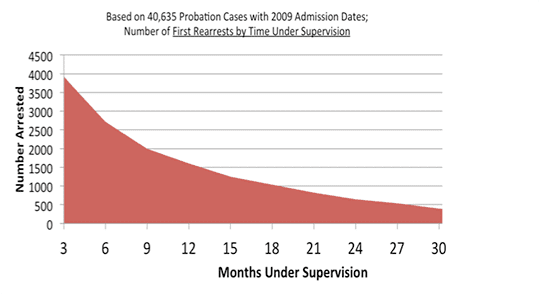Most probationers who will be rearrested do so during the first 6-12 months on supervision, limiting the value of the much longer supervision terms required by NY’s current statutes.
NY State Probation Incarceration Study
In 2012, New York's deputy secretary for public safety requested a review of the state's probation and alternative to incarceration system. This document presents the results of that study.
February 2013 | The Council of State Governments Justice Center and the New York Division of Criminal Justice Services
 New York has a strong probation and ATI system.
New York has a strong probation and ATI system.
- Between 2002 and 2011, the percentage of adults on probation who were rearrested declined 31 percent.
- New York has a robust community of ATIs, who have largely been successful in reaching and treating clients with a high risk of recidivism.
New York state and counties spend $280 million each year to supervise 117,000 probationers. When probationers fail on supervision, New York state and counties spend approximately $100 million on jail and prison costs.
- More than one out of every six (17 percent) adults admitted to prison committed a crime or a condition violation while under probation supervision.
- Approximately 6,100 probationers were resentenced to jail in 2011 because they committed a new crime or violated conditions of probation while under supervision.
- In New York City, 80 percent of probationers successfully completed probation; probationers in the rest of the state had a 65 percent success rate.
New York statutes require probationers to be supervised longer than many other states:
- Felony probation terms are fixed at 5 years in New York.
- Other states typically give judges discretion to set terms between 2-5 years.
- Misdemeanor probation terms are fixed at 3 years in most cases, 1 year in others.
- Other states set terms of 6 months to 24 months.
You might also be interested in
Assigned to the Cloud Crew: The National Incarceration Association’s Hybrid Case Management for People with Behavioral Health Needs
When returning to their communities from criminal justice settings, people with behavioral health needs face barriers in accessing…
Read More
Meet the Medicaid and Corrections Policy Academy Mentor States
New Hampshire Department of Corrections Commissioner Helen Hanks presents at the Medicaid and Corrections Policy Academy in-person meeting.
Read More
Six States Commit to Improving Statewide Strategies to Address Youth Crime, Violence and Behavioral Health
The Council of State Governments (CSG) Justice Center has launched the Collaborating for Youth and Public Safety Initiative…
Read More Assigned to the Cloud Crew: The National Incarceration Association’s Hybrid Case Management for People with Behavioral Health Needs
Assigned to the Cloud Crew: The National Incarceration Association’s Hybrid Case Management for People with Behavioral Health Needs
When returning to their communities from criminal justice settings, people with behavioral health needs face barriers in accessing basic needs—including food, housing, employment, transportation, education, clothing, and substance use and mental health services—which increases their risk of experiencing a crisis.
Read More Meet the Medicaid and Corrections Policy Academy Mentor States
Meet the Medicaid and Corrections Policy Academy Mentor States
New Hampshire Department of Corrections Commissioner Helen Hanks presents at the Medicaid and Corrections Policy Academy in-person meeting.
Read More Six States Commit to Improving Statewide Strategies to Address Youth Crime, Violence and Behavioral Health
Six States Commit to Improving Statewide Strategies to Address Youth Crime, Violence and Behavioral Health
The Council of State Governments (CSG) Justice Center has launched the Collaborating for Youth and Public Safety Initiative (CYPSI) in partnership with six states: California, New Mexico, New York, Ohio, Oklahoma, and Rhode Island. The initiative will help states develop, fund, and effectively implement a research-based service continuum to improve public safety and behavioral health, education, and other outcomes for youth.
Read More Bipartisan Group of 88 Lawmakers Push for Continued Funding for Reentry and Recidivism Programs
Bipartisan Group of 88 Lawmakers Push for Continued Funding for Reentry and Recidivism Programs
A bipartisan group of 88 lawmakers, led by Representatives Carol Miller (R-WV) and Danny Davis (D-IL), wrote a letter calling for continued funding for the Second Chance Act in the Fiscal Year 2026 Commerce, Justice, Science, and Related Agencies appropriations bill.
Read More









